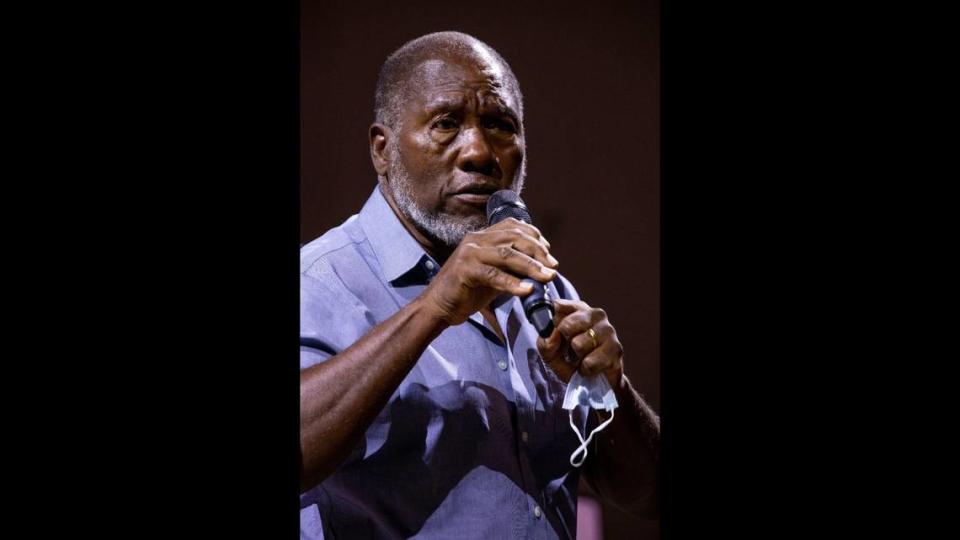Racist incident could’ve killed his son. Forgiveness is the way forward, Dr. Dunn says, and I agree | Opinion
At a time when there is so much hate and turmoil in the world, I found it refreshing and honorable when Dr. Marvin Dunn took the high road and forgave the man who almost killed his son in a hateful incident in Rosewood, Florida, in 2022.
On July 26, after a two-day trial in Gainesville, a jury found David Emanuel, 63, guilty of driving his truck toward Dunn and five other Blacks that included his son Frederick, as they surveyed land in Rosewood, now owned by Dunn. Emanuel narrowly missed hitting Dunn’s son.
On Oct. 19, Emanuel, who lives in Cedar Key, a stone’s throw away from Rosewood, was sentenced to one year and a day in prison, followed by two years of supervised release for his racist actions.
As Emanuel drove his truck towards the group, who walked along a public road, he yelled racist slurs out the window. The hateful, racially motivated incident happened to Dunn, a professor emeritus of psychology at Florida International University, and his group simply because they were Black.
A video showed that after Emanuel was arrested, he complained about being arrested for his racist deed. After all, Emanuel is white. The victims are Black. And to Emanuel, being Black does not matter.
That was the thinking of the whites 100 years ago, in 1923, when they burned Rosewood to the ground, and killing many Blacks who lived there.
Interestingly, while Dunn has found it in his heart to forgive the man who nearly killed his son and could have badly injured several others, Emanuel has shown little remorse for his actions.
I know that some people are just bad to the core. But I still find it hard to believe that an “upright” citizen, as some have referred to Edmanuel, can find it in his heart to want to murder innocent people, simple because of the color of their skin.
Life has been good to Emanuel. (Incidentally the name Emanuel, which is of Hebrew origin, translates to “God with us.”) This country has been good to him. Unlike the Blacks who lived in Rosewood 100 years ago, and who amid the strict segregation laws and hatred, took what they had and established a small section where they could live and work in peace. And later die violently.
Yet, instead of being thankful for the bountiful life he and his family have lived, Emanuel has chosen the low road of jealousy mixed with hate — a dangerous cocktail — toward his fellow men.
‘My parents raised me to forgive’
Recently I spoke briefly with Dunn about his reason for forgiving the man who almost killed his son, Frederick, as they and several others were surveying land that Dunn owns and plans to develop a memorial park honoring the victims of the 1923 massacre.
When I asked Dunn why he chose to forgive Emanuel, he wasn’t bitter, but showed feelings of pity toward the man who almost killed his son, and simply said, “I’m a Christian, Bea. And my parents raised me to forgive… It is when you are most angry that you should reach out for the other person’s hand.”
Dunn said it wasn’t just him, but others in the group, who agreed that they should take the high ground of forgiving Emanuel.
In a letter to judge Allen Winsor, Dunn wrote:
“… For me, my faith requires forgiveness and so I must. It requires me to love my neighbor as well, but I have more work to do on that. I am not asking my neighbor to love me or even to apologize to us. I only ask that he assures the court that we can live in peace as neighbors. We are also doing this as an example to others of what our country requires of us, especially at this challenging moment in our history. Despite our differences we must respect each other and live in peace. …Race in America is a lump in our collective throat, the thorn in our collective side, the unmovable rock in our common path. For America to become whole, the lumps, thorns and rocks must be removed…”
At the sentencing, Dunn said Emanuel apologized in open court, “… and I nodded in return. He [Emanuel] was surrounded by White people who had come to support him.”

Forgiving Emanuel was the right thing to do, Dunn said. “Our country is burning itself with race issues. I just didn’t want to throw another log on the fire. I don’t need to be carrying around this anger. No. We have got to move on beyond the anger or we will never reach peace.”
Forgiveness and forgivers
I agree with Dunn. Over the years, I have written several columns about forgiveness and how it helps to heal the forgiver.
I have never met David Emanuel. But I know this: He has two biblical names. I can’t help but think about his names and if he has ever given any thought to their meaning. Most of us try to live up to our good names. Maybe Emanuel doesn‘t know the significance of his names, thus the reason for his hateful soul.
And maybe he does know, and just doesn’t care that David was the name of a great Jewish king, who the Bible quotes as being “… a man after God’s own heart.”
It is hard to believe that a man with such a significant name could be filled with so much hate.
David Emanuel may never see this column. I hope he does. And I hope that if, and when he reads it, he will take the time to think about his name and what it means, and then live up to it. He will be a better man for it.

Bea Hines can be reached at bea.hines@gmail.com

